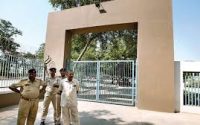Gujarat High Court relief for gynaecologist charged under PCPNDT Act
Source: dnaindia.com
In a major relief to a Shahibaug-based gynaecologist, the Gujarat High Court has directed the Ahmedabad Municipal Corporation (AMC) to de-seal a sonography machine at the doctor’s hospital.
Notably, the civic officials responsible for the implementation of Pre-Conception and Pre-Natal Diagnostic Techniques (PCPNDT) Act, 1994, had sealed the machine on May 14 for alleged violation of the provisions of the Act. The doctor had moved the high court against the action of the civic authorities.
The single-judge bench of Justice AY Kogje after hearing the detailed arguments of the doctor and AMC authorities, pointed: “Considering the manner in which the sealing of the machine has taken place, especially on an application of the petitioner for transfer/re-transfer of location of machine, and the nature of breaches against the petitioner, prima-facie the court finds there not being involvement of the machine for the purpose of sex determination”.
During the hearing of the case, the doctor submitted that his hospital consists of two parts and due to the renovation work going on in one-part, the sonography machine was shifted to another part of the premises with the prior permission of the authorities.
After the completion of the renovation, the doctor approached AMC for re-shifting the machine to its original position. The concerned officials, thereafter, paid a surprise visit and sealed the machine after finding a discrepancy in filling up of ‘Form F’.
The doctor claimed that he is in the medical field for the past 29 years and such highhanded action has tarnished his reputation, especially when the authorities could not find anything to indicate that the machine was illegally used for sex determination.
On the contrary, authorities claimed that sex determination is not the only reason for which the authority can act under the PCPNDT Act. It was claimed that out of the 1,837 ‘Form F’, six forms had deficiencies, which is a clear violation of the Act. However, the doctor explained the deficiencies pointed in the six forms to the court, which being satisfied with the explanation eventually ruled in his favour.



